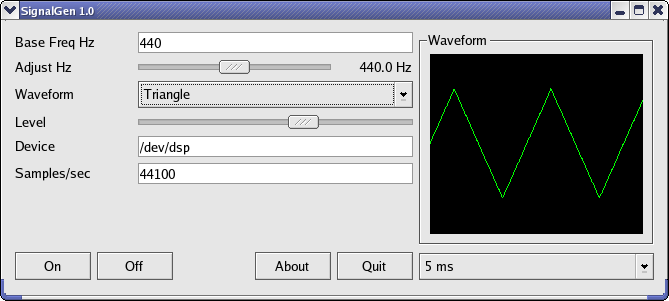

 Share This Page
Share This Page| Home | | Downloads | |  |  |  Share This Page Share This Page |

NOTE: This program is now obsolete, and won't work on many recent systems. It has been replaced by a much better program — click here to visit the new program page.
SignalGen is a free (GPL) Linux (Xwindows GUI-based) utility that generates relatively low frequency signals with the use of a PC sound card. It is an entirely suitable replacement for a hardware signal generator if one doesn't require signals of a frequency higher than about 50 KHz. This is not a Windows program.
SignalGen creates any frequency between a fraction of one Hertz and an upper limit determined by your sound card's capabilities, typically about 50 KHz (accomplished by choosing the highest sampling frequency your sound card will provide, typically about 100 KHz). And, just like a hardware audio generator, it will create sine, triangle, square and sawtooth waves.
SignalGen has a built-in scope to allow you to monitor the generated waveform in real time. SignalGen's frequency accuracy is the same as your sound card, that is to say, a small fraction of one Hertz.
$ signalgen
You can make a desktop shortcut with this as its executable target.| Home | | Downloads | |  |  |  Share This Page Share This Page |